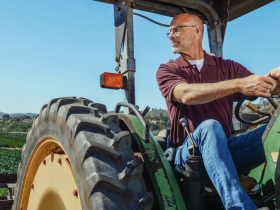Within the construction industry and agricultural industry there are many machines and vehicles commonly used to perform a variety of applications. If you don’t work in either of these industries it is likely you may have never heard of a majority of these vehicles. However, for some of these vehicles, such as the telehandler, it is possible you will have seen them before. This is because some of them are much more common than others and have an incredibly wide range of applications. Where a vehicle such as a combine harvester has a specific application within the agricultural industry, vehicles like a telehandler can be used for a much wider range of jobs.
So what is a Telehandler?
It is a construction vehicle, but can also be classified as an agricultural vehicle under license depending on its application. If it is held under an agricultural license it must only be used for those purposes. For example; if one is used on a farm but the owner then helps a friend out by using it on a building site, they are breaking the law. Telehandlers do have a variety of applications because they are incredibly versatile.
It is designed to carry heavy items and could be described as a vehicle that is a mix of both a crane and a forklift. This is because it is able to carry out many of the jobs that both of those vehicles are capable of. Visually it looks more like a forklift truck and operations wise it’s lifting abilities mean it does everything a forklift truck can, however the large arm attached to it acts as a crane does and enables the person operating it to reach extremely high places.
In order to drive a one you must be over the age of 16 to drive it on a farm (supervision is recommended) and over the age of 18 to drive it on a road. Certain specifications of a telehandler model may require you are over the age of 21 to drive it. In all cases a person must legally be trained in order to use one of these vehicles and hold valid certification showing they have undertaken the necessary training. Certain laws apply to driving a them on the road, so special attention must be paid to those laws and guidelines if a person drives one on a public road.
It has something on it called a boom, which enables it to be adapted to other uses by the way of attachments. The boom is the most individual part of a telehandler and in itself can move items around easily. The fact it can be attached to other parts means the vehicle is extremely versatile. Attachments might be a large container that a person can stand in as the arm lifts up (like a crane), or a large palette that acts as a base for larger or difficult shaped loads that the vehicle needs to carry.
The telehandler is also well known for its ability to move and operate in order to adjust its capabilities. For example; if the driver changes the position of the arm and reach in a certain way, the machine will then be able to hold loads of a higher weight without falling over.
Safety is paramount when using one which is why training is so important. If the angles and reach are not calculated right, the machine may tip and injure those around it and in it. Although there are safety features within the vehicle, it can still be used incorrectly which is why training is essential for any person looking to operate a machine like this.
Telehandlers are commonly owned by farmers and construction companies, however they can also be rented from a telehandler hire company. As the machines are not cheap to buy this can be incredibly useful if you only need to use one for a one-off job, or for a short period of time. This also means you avoid having to buy a license although the rental company will more than likely need you to have had full training, and you may need to carry a license to drive it.

























